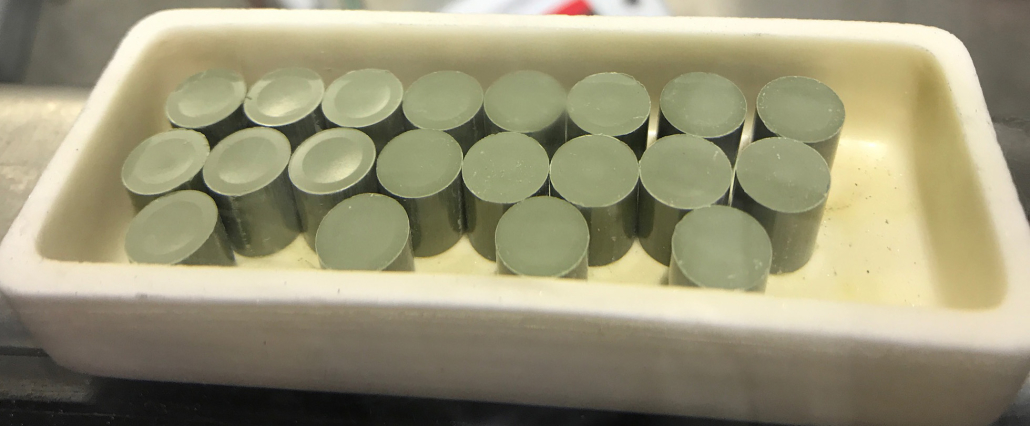Thor Energy and IFE has successfully produced ThMox pellets in their nuclear fuel laboratory at Kjeller outside Oslo, Norway. The high quality pellets were loaded in two fuel pins and assembled into a test rig that was loaded into the OECD Halden research reactor and the irradiation is now under way. Through this milestone, the third phase of a five-year trial-operation of thorium based nuclear fuels has commenced. This is the first time industrial-type ThMox pellets have been fabricated and irradiated with a focus on commercial deployment. The thorium project receives grants from the Norwegian Research Council.
– We have spent the last five years to develop the fuel recipe and the skills to successfully produce these pellets, said Øystein Asphjell, CEO of Thor Energy. – Through this loading of fuel in Halden, we have reached a major milestone and an important stepping stone towards commercial approval for thorium based fuels in existing light water reactors (LWRs). We believe this represents a further step in the thorium evolution which will contribute towards the long-term sustainability of nuclear power in general, Mr. Asphjell said.
The first thorium fuel specimens were loaded into the Norwegian fuel-testing reactor operated by the Institute for Energy Technology in Halden in April 2013, and the second round were loaded in December 2015. Both rigs were intended to verify test results and are considered a further step towards commercializing thorium as a supplement fuel in conventional nuclear reactors.
The third phase of thorium irradiation in the Halden reactor consists of 3 new fuel pins, two ThMox fuel pins and one UOX-fuel reference pin. The Halden test reactor allows for continuous data collection while the fuel operates in the reactor, hence the need for fully instrumented test fuel pins and rigs. The data acquired are necessary to confirm that the fuel could be implemented safely and productively in a commercial reactor.
ThMox is a superior fuel for Pu-disposition, a growing challenge for all nuclear nations. It has several advantages over conventional MOX-fuels, namely: Higher initial Pu-loading possible, higher rate of destruction of Pu, increased safety margins during operations, increased accident tolerance and superior performance in future long term geological disposal.
Three countries, China, India and Turkey, have so far declared thorium as part of their national power policy and in 2015 the OECD-NEA published a paper which concludes that implementation of thorium is sensible and reasonable in the long run. A handful of countries are assessing their options for Pu-disposal, and variants of MOX fuel is one of the solutions. The UK NNL has been a partner of the Thor Energy program since the beginning.
Thor Energy has been undertaking detailed thorium fuel strategy studies since 2006. It is a complex subject involving reactor physics, material science, energy economics and international relations. Collectively, these studies demonstrate that thorium fuels incorporating recycled surplus plutonium are viable in terms of economics, waste management benefits and operational advantages. Importantly, these thorium fuels can operate in new and existing LWRs so new generating infrastructure is not required.
Thorium oxide based fuels can provide advantageous material properties such as higher thermal conductivity and higher melting point – properties that lend safety margin benefits. Thorium fuels can produce less long-lived waste and they generate no new plutonium. Furthermore, they will help diversify the feedstock availability of the nuclear sector.
* The Thorium Irradiation Consortium was initiated in 2011 and led by Thor Energy and has the Institute for Energy Technology (IFE), Norway, Westinghouse, Fortum (Finland), the UK’s National Nuclear Laboratory (NNL), EUs Joint Research Center, Karlsruhe (JRC), and the Korea Atomic Energy Research Institute (KAERI) as consortium partners.
Contact
Sven Røst, VP Communications
tel. +47 932 53 196, sven.rost@scatec.no
Øystein Asphjell, CEO
tel. +47 926 28 910, oystein.asphjell@scatec.no


